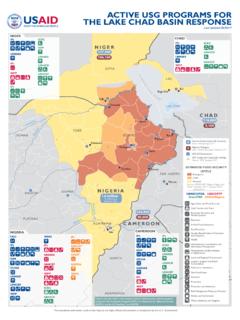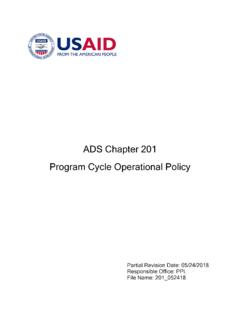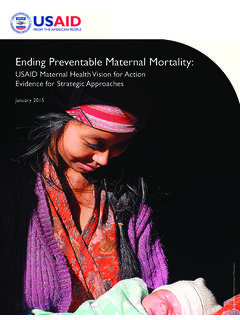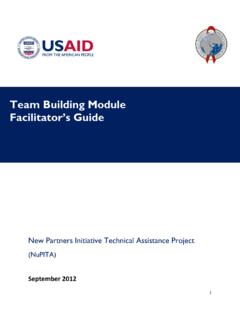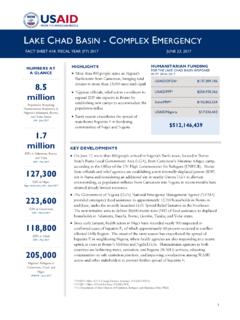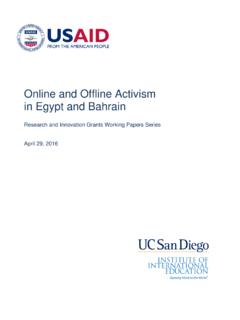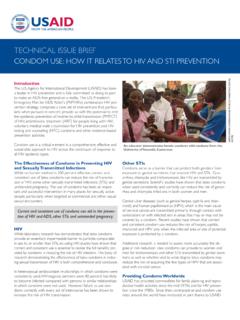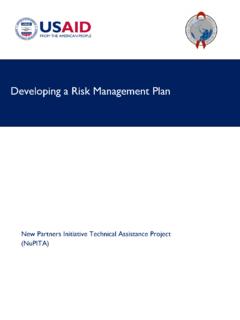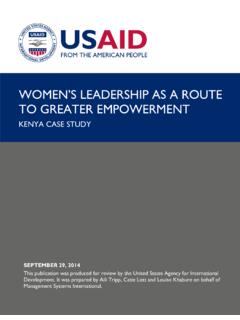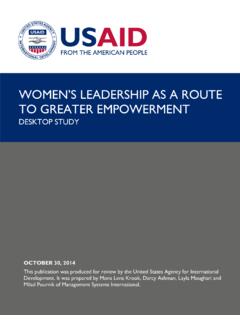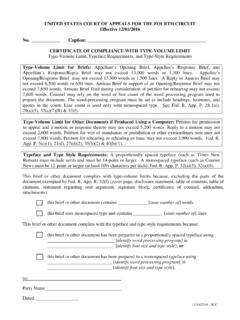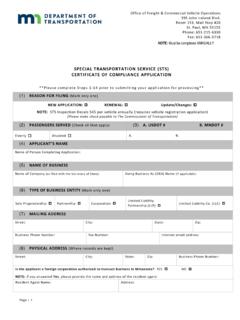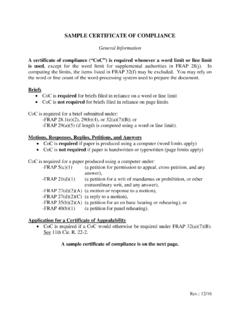Transcription of Mandatory Reference: N/A Supplementary Reference: 303 File ...
1 Mandatory Reference: N/A Supplementary Reference: 303 File: 30359s1 Procurement Reform - Documentation Requirements for Non-Profit Recipients To assist in meeting Agency streamlining goals, the collection of documentation and the procedures for assurance of system compliance for non-profit recipients of USAID awards is being revised. Recipients will be asked to "self-certify" that their personnel, procurement, and travel policies are compliant with applicable OMB circulars and other applicable USAID and Federal regulations. How does the system work? M/OP has prepared a series of reminder checklists (see attachments) containing the most basic requirements that a recipient's systems must meet in order for the recipient to certify that their systems are in compliance with applicable Federal and USAID accepted policies.
2 These checklists are not intended to be comprehensive, but to highlight particular areas of concern. Certification packages will be sent to all non-profit recipients of USAID assistance awards shortly. These packages will contain the following information: 1. Checklists containing minimum requirements for personnel, travel, and procurement systems along with an appropriate certification for their systems; 2. A copy of the certificate covering "Assurance of compliance with Laws and Regulations Governing Nondiscrimination in Federally Assisted Programs," and a statement regarding the annual submission of the certificate (current laws do not allow for annual submission of Drug Free Workplace and Lobbying Certificates); 3.
3 An explanation as to how the self-certification system is supposed to function; and 4. An explanation of anticipated compliance testing by USAID as well as during their annual A-133 audits; Upon receipt of the certification package, the Recipient reviews the package and completes the certification for their systems, completes the Assurance of compliance certificate , and then forwards all of this to M/OP/PS/OCC. M/OP/PS/OCC will review and retain the certifications (both system certifications and annual certification). The recipient must also submit a copy of their systems certification with each proposal they submit in response to a USAID RFA.
4 The systems certification will include language whereby the recipient acknowledges the potential consequences of an inaccurate (either false or intentionally misleading) certification which range from being found not responsible for a particular award to being suspended or debarred under AID Regulation 8. The systems certification will also require that the recipient agree to instruct the accounting firm that they retain to perform their annual A-133 audits to include in their review of the recipient's internal controls sufficient testing of the implementation of the recipient's personnel, travel and procurement policies to confirm compliance with Federal and USAID requirements.
5 The conclusions of this compliance review are to be included in the A-133 audit reports submitted to the government. Testing for compliance and Corrective Steps During the annual A-133 audit of the Recipient, compliance testing will take place. If the compliance testing results in negative findings appearing in the A-133 audit report then M/OP/PS/CAM and M/OP/PS/OCC will assess the severity of the noncompliance(s). M/OP/PS/OCC will be assigned the audit findings for resolution and, if the noncompliance is considered severe, they may recommend that M/OP/E issue a worldwide ALERT NOTICE (Pink Sheet) on the recipient informing Agency offices that the recipient's systems certification is no longer considered valid.
6 When the audit findings have been resolved M/OP/PS/OCC will have the recipient execute a new systems certification (with a current date). They will then have M/OP/E cancel the ALERT NOTICE and, in the process, notify Agency offices of the date on the new (and acceptable) certification. Beyond the above described process, if an Agreement Officer has specific concerns about a recipient, (s)he may request M/OP/PS/CAM to do a review. M/OP/PS/CAM will do one of three things with requests of this nature. They will i) provide the Agreement Officer with pertinent information already available in their files on the recipient, or ii) initiate a special review of the recipient either by CAM itself or by DCAA, or iii) use the information from the Agreement Officer in their Supplementary instructions to the recipient's audit firm on their A-133 audit coverage.
7 In addition, to the extent possible, M/OP/PS/CAM will routinely undertake periodic reviews of a few organizations to test the accuracy and validity of the compliance certification process. How will this help the prospective recipient? Once USAID (M/OP/PS/OCC) receives a system compliance certification from a recipient, the recipient will be expected to submit a copy of that certification with each future application/submission they may make to USAID, as a result Agreement Officers should not request copies of any of the recipient's systems. (We have modified Handbook 13 to delete the requirement for the submission of each recipient's procedures in the January 1996 issuance of the ADS.)
8 In addition, Agreement Officers shall not require organizations to provide salary histories for any employees if the organization has certified its systems. This has, heretofore, been a fairly common practice although it has never been authorized by Handbook 13 and its discontinuance will save substantial time and effort. This system should reduce the number of document submissions a recipient will have to make to the Agency. The reduction in the duplicate data collection will be beneficial to both USAID and to grant/agreement recipients. What if the Recipient Doesn't Certify? Given the language in the systems certification, the intentions and the business acumen of a potential recipient of a USAID assistance award who refuses to certify would have to be considered suspect.
9 This is because, by refusing to certify, the potential recipient may be saying that they do not intend to comply with USAID's requirements. In such a case, it should be very difficult for an Agency Agreement Officer to find the organization responsible, since one of the most basic underlying assumptions in any USG contract or assistance award is that the awardee will comply with all applicable Federal (and USAID) laws and regulations. What does this change mean to Agreement Officers and Negotiators? First, it means that there will be a basic presumption (as in contracts) that recipients will comply with the government's requirements and the Agency will expect (and rely) on each recipient's ability to manage itself in accordance with the terms of the agreement.
10 , , that they will employ, pay, promote, travel, etc. their employees and award and administer subagreements in accordance with the requirements stipulated in their agreements. This will result in less "micromanagement" of recipients by Agreement Officers, negotiators, COTRs and other project staff. Since we will be relying on the recipient to manage itself, we will be in a much stronger position to take remedial action if that management is found by subsequent program reviews, audits, etc. to be deficient. On the other hand, this approach does not relieve Agreement Officers and negotiators of their basic responsibility to assure that agreement costs/prices are fair and reasonable.
